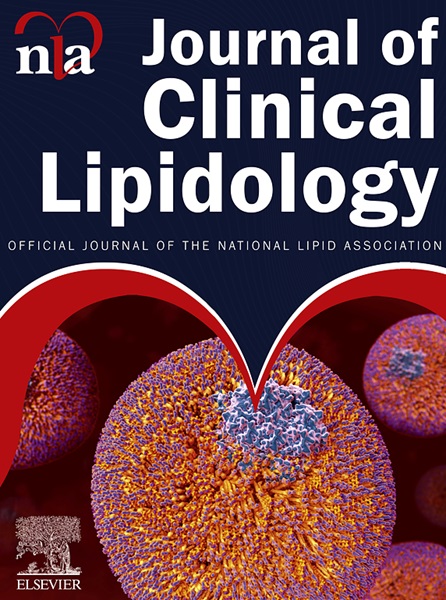将脂蛋白(a)整合到内科住院医师的心脏代谢健康课程中:游戏化与传统讲座的知识保留
IF 4.6
3区 医学
Q2 PHARMACOLOGY & PHARMACY
引用次数: 0
摘要
脂蛋白(a) (Lp(a))是帮助识别动脉粥样硬化和主动脉狭窄高危患者的重要生物标志物。尽管关于Lp(a)的文献不断发展,并且国家脂质协会建议对所有成年患者进行一次终身检测,但筛查率仍然很低。医学教育中的游戏化促进了主动学习,增加了参与性,但其对Lp(a)教育提供者的影响尚不清楚。目的/目的我们旨在评估内科住院医师是否可以从Lp(a)的内容中受益,以及通过传统讲座或游戏化格式的授课是否可以改善学习结果。方法:我们将Lp(a)内容整合到一个大型学术住院医师项目的内科住院医师心脏代谢健康课程中。内容取自国家脂质协会和美国心脏病学会指南。居民们接受了50分钟的在线案例回顾式讲座,讲座采用传统的、基于幻灯片的格式或利用KAHOOT!®的游戏化格式。事后调查包括5点李克特量表来评估自我报告的专业指南知识、知识基础问题和格式偏好。使用不相等方差的配对学生t检验对数据进行分析,以比较匹配的前后李克特量表评分和知识测试分数。结果108名参与调查的居民中,有19人(17.6%)完成了问卷调查,其中游戏化组有12/65(18.4%),传统组有7/43(16.2%)。在会前,47%的住院医生报告说他们对进行Lp(a)筛查没有信心。游戏化后的测试成绩显著提高(平均45%到87%,p <;0.01)和传统组(平均42% ~ 85%,p <0.01)。在两组之间,李克特量表评分或测试分数的增加没有差异。91%的住院医师认为讲座很有吸引力,与未来的实践相关。71%的传统组居民和91%的游戏化组居民更喜欢游戏化的形式。结论游戏化和传统的讲座形式对居民进行Lp(a)教育是有效的。住院医生发现Lp(a)材料与临床实践相关,并且更喜欢游戏化的格式。进一步的研究将评估游戏化Lp(a)内容的整合是否会增加我们住院诊所中基于指南的Lp(a)筛查。本文章由计算机程序翻译,如有差异,请以英文原文为准。
Integrating lipoprotein(a) into a cardiometabolic health curriculum for internal medicine residents: Gamified vs. traditional lecture for knowledge retention
Background/Synopsis
Lipoprotein(a) (Lp(a)) is an important biomarker to help identify patients at high risk of atherosclerosis and aortic stenosis. Despite the evolving literature on Lp(a) and recommendations from the National Lipid Association for a single lifetime test for all adult patients, screening rates remain low. Gamification in medical education promotes active learning that increases engagement, but its impact on educating providers on Lp(a) remains unclear.
Objective/Purpose
We aimed to assess whether internal medicine residents could benefit from content on Lp(a) and whether delivery via traditional lecture or a gamified format improved learning outcomes.
Methods
We integrated Lp(a) content into our cardiometabolic health curriculum for internal medicine residents at a large academic residency program. Content was drawn from the National Lipid Association and American College of Cardiology guidelines. Residents received a 50-minute online case-review style lecture in a traditional, slide-based format or a gamified format utilizing KAHOOT!®. Pre-post surveys included 5-point Likert scales to assess self-reported knowledge of professional guidelines, knowledge-based questions, and format preference. Data were analyzed using paired Student's t-tests with unequal variance to compare matched pre-post Likert scale ratings and knowledge test scores.
Results
Of 108 participating residents, 19 (17.6%) completed pre-post surveys, with 12/65 (18.4%) in the gamified group and 7/43 (16.2%) in the traditional group. Before the session, 47% of residents reported having no confidence in performing Lp(a) screening. There were significant pre-post increases in test scores in the gamified (mean 45% to 87%, p < 0.01) and traditional (mean 42% to 85%, p <0.01) groups. Between groups, there was no difference in the increase of Likert scale ratings or test scores. 91% of residents found the lecture engaging and relevant to future practice. 71% of residents in the traditional group and 91% in the gamified group preferred a gamified format.
Conclusions
Gamified and traditional lecture formats were effective in educating residents on Lp(a). Residents found Lp(a) material relevant to clinical practice and preferred the gamified format. Further studies will assess whether integration of gamified Lp(a) content increases guideline-based screening of Lp(a) in our resident clinics.
求助全文
通过发布文献求助,成功后即可免费获取论文全文。
去求助
来源期刊
CiteScore
7.00
自引率
6.80%
发文量
209
审稿时长
49 days
期刊介绍:
Because the scope of clinical lipidology is broad, the topics addressed by the Journal are equally diverse. Typical articles explore lipidology as it is practiced in the treatment setting, recent developments in pharmacological research, reports of treatment and trials, case studies, the impact of lifestyle modification, and similar academic material of interest to the practitioner.
Sections of Journal of clinical lipidology will address pioneering studies and the clinicians who conduct them, case studies, ethical standards and conduct, professional guidance such as ATP and NCEP, editorial commentary, letters from readers, National Lipid Association (NLA) news and upcoming event information, as well as abstracts from the NLA annual scientific sessions and the scientific forums held by its chapters, when appropriate.

 求助内容:
求助内容: 应助结果提醒方式:
应助结果提醒方式:


